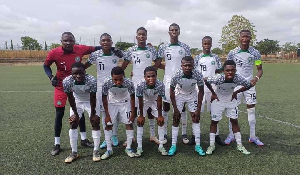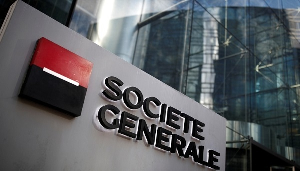- Home - News
- TWI News | TV
- Polls
- Year In Review
- News Archive
- Crime & Punishment
- Politics
- Regional
- Editorial
- Health
- Ghanaians Abroad
- Tabloid
- Africa
- Religion
- Election 2020
- Coronavirus
- News Videos | TV
- Photo Archives
- News Headlines
- Press Release
General News of Monday, 10 April 2000
Source: GNA
Lower Volta Basin feels neglected by VRA.
Battor (V/R), April 10, GNA - The Riparian Society of Ghana, an non-governmental organisation (NGO) seeking the wellbeing of the people of the Lower Volta Basin has called on the Volta River Authority (VRA) to live up to its non-power functions of assisting in the development of the area.
It noted that the construction of the Akosombo and Kpong dams has brought about the socio-economic, environmental and cultural changes, which have adversely affected the peoples' main source of livelihood and impoverished them.
Mr Cornelius Kodjo Yakah, Executive Director of the Riparian Society said Act 46 of 1961 establishing the VRA enjoins the Authority to provide certain development needs of the area under its non-power functions but the VRA has neglected the Lower Volta Basin.
Mr Yakah made the call in an interview with the Ghana News Agency during a seminar organised for students of the SOS Hermann Gmeiner International College (HGIC) at Mafi-Maklamador, near Battor.
The two-day seminar on the "Theory of Knowledge" was aimed at educating 67 students of the HGIC from different African countries on how to understand and appreciate the cultural values of other peoples.
Mr Yakah noted that before the construction of the two dams, the main source of livelihood for the communities of the lower Volta Basin, which were mainly along the tributaries of the Volta River, was fishing, farming and picking of oysters.
However, with the construction of the dams, most of these tributaries got silted up. Rich alluvial soils deposited by annual floods for farming purposes ceased, a number of tributaries of the Volta River have disappeared and the reduced flow rate has increased the incidence of water borne diseases in the communities.
As a result of these developments, fishing and farming are no longer attractive and this degenerated into a situation of hopelessness resulting in poverty and illiteracy to the first degree.
Children from the area have no scholarship schemes and the farthest most of them often climb to on the educational ladder is the junior secondary school (JSS) level.
The Riparian Society was of the view that at least the VRA should have built model schools and established scholarship schemes to enable them to further their education.
Mr Reuben Coffie, a Marketing Specialist and a native of the area said as a result of the poverty, people begun exploiting cultural practices like the Trokosi system and this degenerated into human rights abuses and the resulting attacks from all angles.
Communication, transport, education and other social developments in the North and South Tongu districts are bad. He said a recent grant of 30 million US dollars from the Japanese government went to the Upper Volta Basin while most villages of the North and South Tongu districts also need assistance to bring them back to life.
Mr Coffie said the Riparian Society is interested in development projects, which could bring the people some hope but it has not got the funds for it and is, therefore, trying to attract some NGOs and investors to the area.
The society is conducting feasibility studies into the possibility of dredging some of the tributaries to convert them into fish farms to serve as a source of livelihood for fishermen.
Other activities include encouraging investors to go into large-scale vegetable farming, which would employ local hands and the establishment of lime industries since the area abounds in oyster shells. Mr Coffie said the VRA could undertake some of these ventures.










